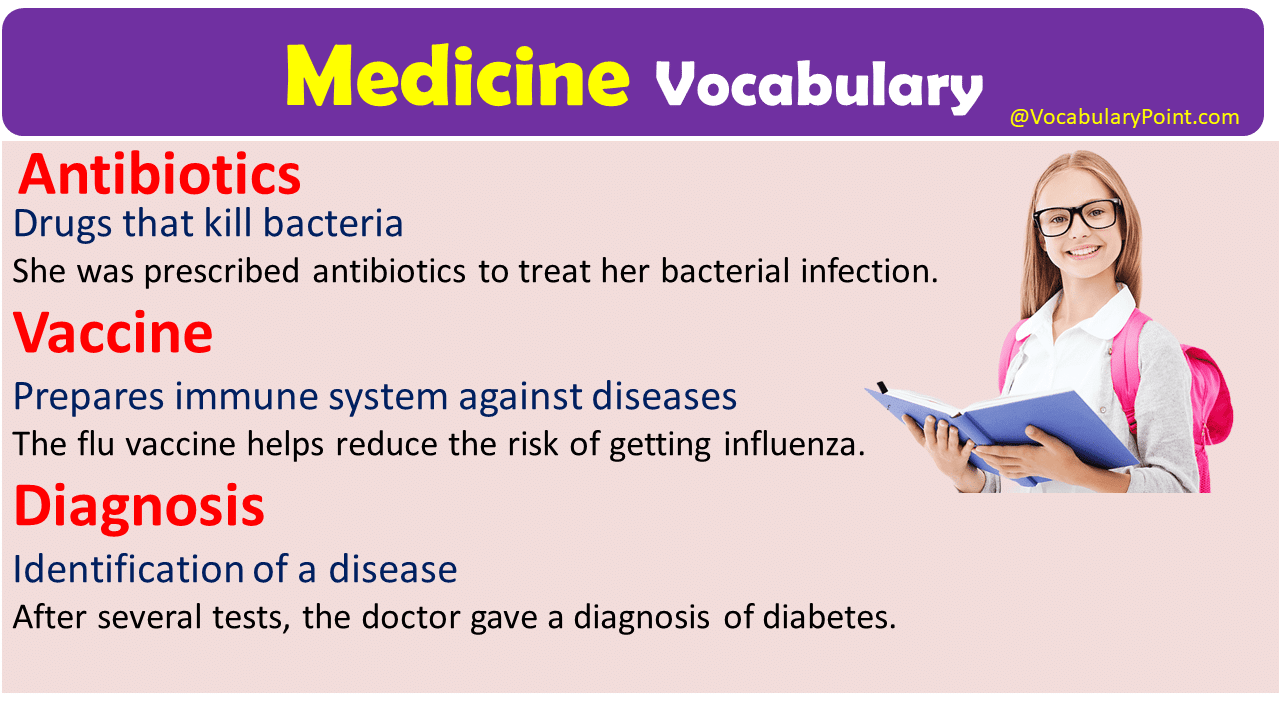Health And Medicine Vocabulary, where precision and clarity are paramount, language serves as both a tool and a barrier. Imagine navigating a bustling hospital corridor filled with doctors in white coats discussing diagnoses like quoting lines from Shakespeare—each term laden with meaning yet often perplexing to the untrained ear.
The vocabulary that underpins this field is not merely jargon; it represents centuries of evolution in science, culture, and human experience. For patients seeking understanding or aspiring medical professionals honing their skills, mastering this lexicon can be both daunting and exhilarating.
Medicine Vocabulary
1. Antibiotics
Definition: Drugs that kill bacteria
Example: She was prescribed antibiotics to treat her bacterial infection.
2. Vaccine
Definition: Prepares the immune system against diseases
Example: The flu vaccine helps reduce the risk of getting influenza.
3. Diagnosis
Definition: Identification of a disease
Example: After several tests, the doctor gave a diagnosis of diabetes.
4. Symptom
Definition: Signs of disease or injury
Example: Persistent cough and fever are symptoms of the flu.
5. Therapy
Definition: Treatment methods for illness
Example: He underwent physical therapy to recover from his surgery.
6. Chronic
Definition: Long-lasting or recurrent
Example: She suffers from chronic arthritis that affects her daily activities.
7. Acute
Definition: Severe but short-term
Example: He was hospitalized for acute appendicitis.
8. Remission
Definition: Reduction or disappearance of symptoms
Example: The patient’s cancer is in remission after several months of treatment.
9. Prognosis
Definition: Expected outcome of a disease
Example: The prognosis for the disease with early intervention is generally good.
10. Anesthesia
Definition: Loss of sensation or awareness
Example: General anesthesia was administered before the surgery to make him unconscious.
11. Biopsy
Definition: Sample of tissue for testing
Example: The doctor ordered a biopsy to determine the nature of the tumor.
12. Epidemic
Definition: Widespread occurrence of an infectious disease
Example: The health department is taking measures to control the flu epidemic.
13. Inflammation
Definition: Body’s response to injury
Example: Swelling and redness are signs of inflammation around the injured area.
14. Palliative
Definition: Relieving pain without curing
Example: Palliative care is provided to improve the quality of life for patients with chronic illnesses.
15. Pathogen
Definition: Microorganism that causes disease
Example: Identifying the pathogen was the first step in tackling the outbreak.
16. Radiology
Definition: Use of X-rays and radiation in diagnosis
Example: She specializes in radiology, which involves reading MRI and CT scans.
17. Sepsis
Definition: Body’s extreme response to infection
Example: Early treatment of sepsis can prevent its progression into shock.
18. Triage
Definition: Prioritizing patients based on need
Example: Triage at the accident scene helped save lives by treating the most critical patients first.
19. Vaccine
Definition: Biological preparation providing immunity
Example: The COVID-19 vaccine was developed to provide immunity against the virus.
20. X-ray
Definition: Imaging technique using radiation
Example: The X-ray showed a fracture in his left leg that needed immediate attention.
Explore More:
Health And Medicine Vocabulary
- Analgesic – Medication that reduces or eliminates pain.
- Antibiotic – Drug that kills or inhibits bacteria.
- Antidepressant – Medication used to treat depressive disorders.
- Antihistamine – Drug that counters allergic reactions, symptoms.
- Antiseptic – Substance that prevents infection by killing microorganisms.
- Biopsy – Removal of tissue sample for examination.
- Catheter – Tube for injecting fluids, draining urine.
- Chemotherapy – Drug treatment for cancer, kills cells.
- Diuretic – Medication causing increased urine production.
- Epidural – Anesthesia injected into the spinal area.
- Immunization – Vaccination to protect against specific diseases.
- Inhaler – Device delivering medicine to the lungs.
- Laxative – Substance that helps relieve constipation.
- MRI (Magnetic Resonance Imaging) – Imaging technique using magnetic fields, radio waves.
- Neurology – Medical specialty dealing with nervous system disorders.
- Oncology – Study and treatment of tumors.
- Opioid – Drug used for pain relief, addictive.
- Orthopedics – Branch of medicine treating the musculoskeletal system.
- Pacemaker – Device regulating abnormal heart rhythms.
- Placebo – Harmless pill, used in controlled studies.
- Prescription – Doctor’s authorization for medication or treatment.
- Prognosis – Prediction of disease outcome.
- Radiation Therapy – Cancer treatment using targeted radiation.
- Stent – Tube inserted into vessel, keeping it open.
- Steroid – Synthetic drugs reducing inflammation, enhancing performance.
- Stethoscope – Instrument for listening to body sounds.
- Surgical – Relating to or involving surgery.
- Thermometer – Device used to measure body temperature.
- Ultrasound – Imaging method using sound waves.
- Vaccine – Preparation inducing immunity against a disease.
- Vasodilator – Medication that dilates blood vessels.
- Virology – Study of viruses and viral diseases.
- X-ray – Imaging technique using radiation for diagnostics.
- Beta Blocker – Drug that reduces blood pressure, heart workload.
- Antipsychotic – Medication treating psychiatric conditions.
- Blood Pressure Monitor – Device measuring arterial blood pressure.
- CT Scan (Computed Tomography) – Detailed internal images created by computer-linked X-rays.
- Dermatology – Medical field specializing in skin conditions.
- Electrocardiogram (ECG) – Record of the heart’s electrical activity.
- Gastroenterology – Study of the stomach, intestines’ disorders.
- Hormone Therapy – Treatment using hormones, modifies hormone levels.
- Insulin – Hormone regulating blood glucose levels.
- Lithotripsy – Treatment breaking kidney stones using shockwaves.
- Mammogram – X-ray of the breast for cancer.
- Pathology – Study of disease causes, effects.
- Psychiatry – Branch of medicine treating mental illness.
- Rehabilitation – Therapy aimed at recovery from injuries.
